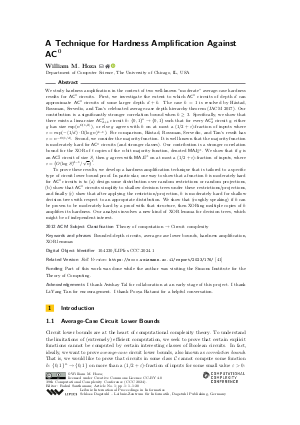@InProceedings{hoza:LIPIcs.CCC.2024.1,
author = {Hoza, William M.},
title = {{A Technique for Hardness Amplification Against AC⁰}},
booktitle = {39th Computational Complexity Conference (CCC 2024)},
pages = {1:1--1:20},
series = {Leibniz International Proceedings in Informatics (LIPIcs)},
ISBN = {978-3-95977-331-7},
ISSN = {1868-8969},
year = {2024},
volume = {300},
editor = {Santhanam, Rahul},
publisher = {Schloss Dagstuhl -- Leibniz-Zentrum f{\"u}r Informatik},
address = {Dagstuhl, Germany},
URL = {https://drops.dagstuhl.de/entities/document/10.4230/LIPIcs.CCC.2024.1},
URN = {urn:nbn:de:0030-drops-203977},
doi = {10.4230/LIPIcs.CCC.2024.1},
annote = {Keywords: Bounded-depth circuits, average-case lower bounds, hardness amplification, XOR lemmas}
}

 Creative Commons Attribution 4.0 International license
Creative Commons Attribution 4.0 International license



